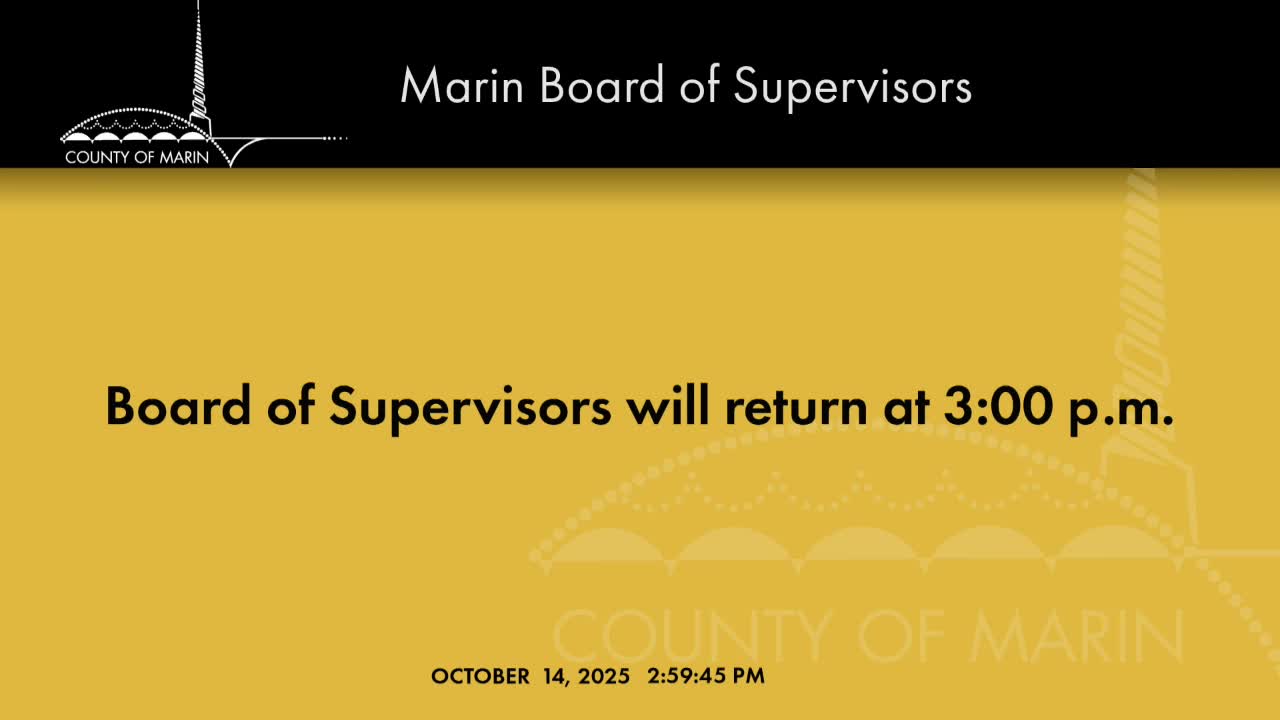Board approves tax‑exempt bond hearing for Golden Gate Village revitalization; residents raise concerns about process
Get AI-powered insights, summaries, and transcripts
Subscribe
Summary
The Board of Supervisors conducted a TEFRA hearing and approved a resolution allowing issuance of up to $50 million in tax‑exempt bonds to support Phase 1 renovations of Golden Gate Village. Housing authority and developer say no resident in good standing will lose housing; resident council speakers urged stronger resident safeguards and an MOU.
The Marin County Board of Supervisors held a Tax Equity and Fiscal Responsibility Act (TEFRA) public hearing and adopted a resolution approving the issuance of tax‑exempt bonds (up to $50,000,000) to support Phase 1 of the Golden Gate Village revitalization, a preservation and rehabilitation project led by the Marin Housing Authority in partnership with Burbank Housing and to be issued through the California Municipal Finance Authority (CMFA).
The board’s action authorizes the procedural step required under Internal Revenue Code Section 147(f) so the project can use tax‑exempt financing that supports long‑term affordable housing preservation. County staff and the housing authority emphasized that the county has no ongoing financial obligation for the bonds and that the housing authority and developer are responsible for loan repayment.
Why this matters: Golden Gate Village is listed on the National Register of Historic Places and contains 296 income‑restricted apartment homes in Marin City. Marin Housing Authority and its development partner say the financing will pay for comprehensive renovations (new kitchens, bathrooms, mechanical upgrades and other unit and building‑level improvements), preserve 100% of affordability, and secure tenants’ right to return after temporary relocations.
Project and financing overview
Mike Andrews, development consultant to the housing authority, told the board Phase 1 covers about 88 units (87 residential units plus a resident manager unit) and is the first of three planned phases that together will rehabilitate the site. The project secured a 4% Low‑Income Housing Tax Credit allocation earlier this year; the developers said that award makes the tax‑exempt bond financing critical to reach financial closing.
Staff described sources and uses for Phase 1: the project anticipates construction‑period financing (presentation figures cited approximately $45 million during construction, reducing to a permanent loan of roughly $33 million when tax‑credit equity is placed). As a precaution, the TEFRA authorization before the board set a maximum bond issuance cap of $50 million to allow room for construction‑period financing needs and market changes; the county stressed the cap does not create county liability.
Affordability and resident protections
Housing authority and development staff repeatedly stated that “no resident in good standing will lose their housing” and that residents would be assisted through any temporary relocations, which staff estimated would last about three to four months for affected households. The housing authority will retain ownership of the land and maintain long‑term affordability through HUD project‑based rental subsidy structures; staff said the project‑based subsidy contract is intended to be long‑term and is structured to renew under HUD rules.
Public comment: resident council concerns and community support
Resident council leaders and several longtime volunteers voiced strong concerns about resident participation and the memorandum of understanding (MOU) between the housing authority and the resident council. Royce Macklemore, chair of the Golden Gate Village Resident Council, said the council’s earlier resident plan and a land‑trust alternative were not adopted and said the council had been excluded from some follow‑on meetings; he urged stronger resident protections and transparent, complete documents.
Other residents and volunteers urged the board to approve the TEFRA financing so construction can start; Barbara Bogart, a volunteer who has worked on the project for about a decade, said the tax‑exempt bond authorization was necessary to preserve the project’s recently awarded tax credits and to avoid losing momentum.
Board action and logistics
The board adopted the resolution approving the TEFRA finding (attachment A in the staff packet) by unanimous roll call. Dan Eilerman, assistant county executive, and Anthony Stubbs of the California Municipal Finance Authority described the county’s role as limited to the required TEFRA public hearing; the Marin Housing Authority and Burbank Housing will proceed with financing, construction contracting and resident relocation plans.
Ending
With the TEFRA authorization in place, housing authority staff said they expect to move toward financial closing and start Phase 1 construction in 2026. Supervisors and community speakers urged continued, documented resident engagement and executed MOU language to formalize resident rights and relocation assistance before construction begins.
